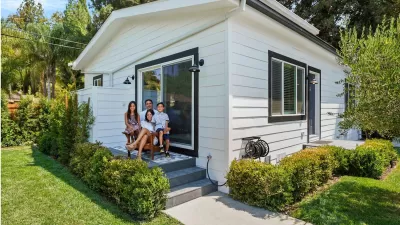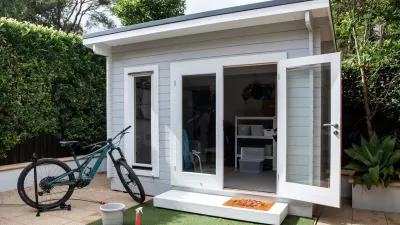The city hopes adjusting its regulations for accessory dwelling units will make the process more affordable for residents and help ease the city’s housing crunch.

The Denver City Council passed an amendment to its zoning code that makes the rules for building accessory dwelling units (ADU) more flexible in hopes of making ADU construction more affordable and feasible for the city’s residents.
As Desiree Mathurin explains in Denverite, the change is a result of recommendations from an ADU Advisory Committee created last year to determine barriers to ADU construction. “The goal of the committee was to look at some of the construction technicalities in the zoning code, including size and placement, and decide whether changing these rules would make ADUs easier to build.”
The committee found that “Tailoring the ADU construction rules around which neighborhood context they inhabit allows the ADUs to be a better fit for each neighborhood. And they make ADUs easier to build because now homeowners don’t have to worry about those uniform technicalities,” said Genna Morton, communications specialist with Community Planning and Development. Tailoring rules to each neighborhood can also reduce costs by letting homeowners build the type of ADU that fits best within the constraints of their lot and surroundings.
The new rules use existing Suburban, Urban Edge, and Urban designations to adjust ADU regulations. “For example, homes in Urban zoning areas typically have smaller lot sizes. With uniform ADU size requirements, some homeowners couldn’t build on their lots even if their neighborhood was zoned for an ADU.” Now, the regulations will take zoning areas into account to remove unnecessary barriers.
FULL STORY: City Council makes building ADUs easier by passing zoning code amendment

Alabama: Trump Terminates Settlements for Black Communities Harmed By Raw Sewage
Trump deemed the landmark civil rights agreement “illegal DEI and environmental justice policy.”

Study: Maui’s Plan to Convert Vacation Rentals to Long-Term Housing Could Cause Nearly $1 Billion Economic Loss
The plan would reduce visitor accommodation by 25% resulting in 1,900 jobs lost.

Why Should We Subsidize Public Transportation?
Many public transit agencies face financial stress due to rising costs, declining fare revenue, and declining subsidies. Transit advocates must provide a strong business case for increasing public transit funding.

Wind Energy on the Rise Despite Federal Policy Reversal
The Trump administration is revoking federal support for renewable energy, but demand for new projects continues unabated.

Passengers Flock to Caltrain After Electrification
The new electric trains are running faster and more reliably, leading to strong ridership growth on the Bay Area rail system.

Texas Churches Rally Behind ‘Yes in God’s Back Yard’ Legislation
Religious leaders want the state to reduce zoning regulations to streamline leasing church-owned land to housing developers.
Urban Design for Planners 1: Software Tools
This six-course series explores essential urban design concepts using open source software and equips planners with the tools they need to participate fully in the urban design process.
Planning for Universal Design
Learn the tools for implementing Universal Design in planning regulations.
Caltrans
Smith Gee Studio
Institute for Housing and Urban Development Studies (IHS)
City of Grandview
Harvard GSD Executive Education
Toledo-Lucas County Plan Commissions
Salt Lake City
NYU Wagner Graduate School of Public Service





























